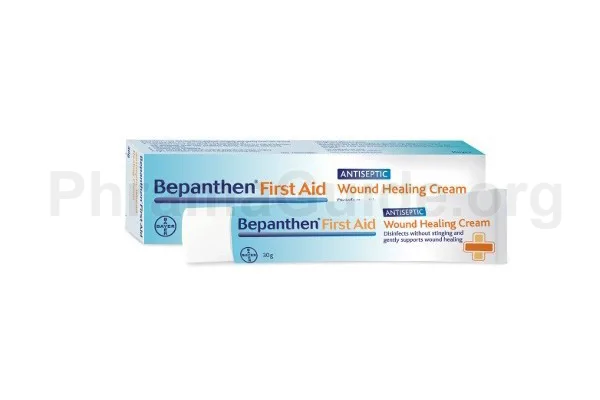Bepanthen cream is a topical medication and is an antiseptic and disinfectant. It is primarily used for various medical and dermatological purposes due to its ability to kill or inhibit the growth of a wide range of microorganisms, including bacteria, fungi, and some viruses.
About Bepanthen Cream
- Generic Name: Chlorhexidine Hydrochloride
- Properties: Antibiotic
- Manufactured and Marketed By: Bayer Schering Pharma
- Presentation: 15gm and 30gm Tube (Cream form)

Common Uses and Indications of Bepanthen Cream
- Skin Infections: Bepanthen cream is used to prevent and treat various skin infections, including bacterial skin infections (such as impetigo) and fungal infections (such as ringworm or athlete’s foot).
- Surgical Site Antisepsis: Before surgical procedures, healthcare professionals may use Bepanthen cream or a Bepanthen-based solution to cleanse and disinfect the skin at the surgical site to reduce the risk of surgical site infections.
- Catheter Care: Bepanthen cream is sometimes used in healthcare settings to care for and prevent infections related to indwelling catheters or other medical devices inserted into the skin.
- Wound Care: Bepanthen cream can be applied to clean and disinfect minor cuts, scrapes, and abrasions. It helps reduce the risk of infection and promotes wound healing.
- Burns: For minor burns, Bepanthen cream can be used to prevent infection and support the healing process.
- Pressure Ulcers: In some cases, healthcare professionals may use Bepanthen cream to prevent or treat pressure ulcers (bedsores) in patients who are bedridden or have limited mobility.
- Dermatitis: Bepanthen cream may be prescribed for certain types of dermatitis, especially when there is a secondary bacterial or fungal infection.
- Acne: In some cases, Bepanthen-based products may be recommended for acne treatment due to their antimicrobial properties. However, this use is less common than other acne treatments.
Off-label Uses of Bepanthen Cream
- Burns and Wound Infections: In addition to its standard use for wound care, Bepanthen cream may be used off-label for managing burns or wound infections. However, other specialized wound care products are often preferred.
- Dermatitis and Skin Irritations: In cases where dermatitis or skin irritations are accompanied by secondary bacterial or fungal infections, a healthcare provider may prescribe Bepanthen cream off-label to address both the underlying infection and the dermatological issue.
- Preventive Measures: In some healthcare settings, Bepanthen cream may be used off-label as a preventive measure, such as for catheter site care or in patients at higher risk of infections due to medical conditions or immunosuppression.
- Chronic Wounds: For certain types of chronic wounds, such as pressure ulcers or diabetic foot ulcers, healthcare providers may consider using Bepanthen cream off-label as part of a multifaceted wound care strategy.
Formulation and Ingredients
- Chlorhexidine Hydrochloride: 5.5mg/gm
How to Apply Bepanthen Antiseptic Cream?
To make the most of this cream, follow these application steps:
- Proper Cleansing: Start by gently cleaning the affected area with mild soap and water.
- Thin Layer Application: Apply a thin layer of Bepanthen Antiseptic Cream to the affected area. For wounds or cuts, ensure the cream covers the entire injured area.
- Frequency Matters: Reapply the cream as needed, typically two to three times a day or as advised by a healthcare professional.
- Covering Deeper Wounds: For deeper wounds, consider covering the area with a sterile dressing or bandage after applying the cream.
Who Should Use Bepanthen Cream (and Who Shouldn’t)?
Ideal Users:
- Minor Skin Injuries: Bepanthen Antiseptic Cream is ideal for minor skin injuries such as cuts, scrapes, and burns to prevent infection and promote healing.
- Diaper Rash: It is safe and effective for soothing and preventing diaper rash in infants.
- General Skin Care: Anyone looking for a reliable antiseptic and moisturizing cream for everyday skin care.
Cautionary Notes:
- Severe Infections: If you suspect a severe infection, consult a healthcare provider before using this cream. It may not be suitable for treating advanced infections.
- Known Allergies: Individuals with known allergies or sensitivities to any of the cream’s ingredients should avoid using it.
- Deep Wounds: For deep wounds or punctures, consult a healthcare professional for appropriate wound care.
FAQs
- Q: Can Bepanthen Antiseptic Cream be used for diaper rash in infants?
Yes, it is safe and effective for soothing and preventing diaper rash in infants. - Q: How often should I apply the cream for optimal results?
Typically, apply the cream two to three times a day or as advised by a healthcare professional. - Q: Can I use Bepanthen Antiseptic Cream on my face?
While it’s generally safe, it’s best to consult with a dermatologist for suitable alternatives for facial use. - Q: Is this cream safe for individuals with sensitive skin?
Yes, it is generally safe for individuals with sensitive skin. However, if you have concerns, perform a patch test or consult with a healthcare provider. - Q: What should I do if my condition worsens after using the cream?
If your condition worsens or doesn’t improve after using the cream, consult a healthcare provider for further evaluation and guidance.
Bepanthen Cream’s Alternatives : Other Similar Brands
The following are Some alternative brands of Bepanthen Cream and their manufacturers.
Clinica : Platinum Pharmaceuticals (Pvt) Ltd, Pakistan.
Orahex : Zanctok Pharmaceuticals, Pakistan.

Leave A Comment